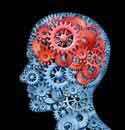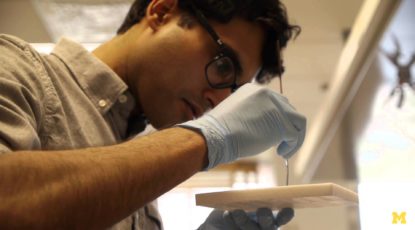-
Depression and the body clock
Every cell in our bodies runs on a 24-hour clock, tuned to the night-day, light-dark cycles that have ruled us since the dawn of humanity. New research shows that clock may be broken in the brains of people with depression.
-
Brain scans reveal first objective measure of pain
Scientists have identified how much pain people feel by looking at images of their brains. The research may set the stage to objectively measure anxiety, depression, anger, and more.
-
Building better blood vessels could advance tissue engineering
U-M researchers may have found a way to circumvent a major obstacle in growing replacement hearts, lungs, and kidneys.
-
The Anatomy Lesson: 2013
A new Medical School program offers a rare opportunity for body donors to share their life stories with the U-M students who one day will dissect them.
Video: The Ultimate Gift—How a Patient’s Brain Touched His Doctor’s Heart.
-
Overeating linked to newly discovered brain mechanism
A part of the brain usually thought to control movement also may cause people to overeat, say U-M researchers.
-
Minorities, Medicaid, and a lack of antidepressants
Study: African-Americans and Hispanics with major depressive disorder are less likely to get antidepressants than Caucasian patients, and Medicare and Medicaid patients are less likely to get the newest generation of antidepressants.
-
Big head, bad health
Study: Even though narcissists have grandiose self-perceptions, they also have fragile views of themselves, and often resort to aggression when their sense of superiority is threatened,
-
Sheri Fink's deep reporting
She won a Pulitzer Prize for uncovering tragic events at a New Orleans hospital following Hurricane Katrina, but that was just one small part of a remarkable career.








